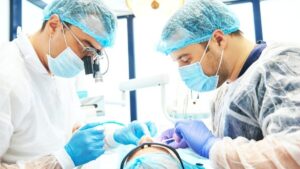Treatment for central sleep apnea? cleep disorders are a prevalent concern in today’s fast-paced world. Among them, central sleep apnea is a condition that affects many individuals, causing disruptions in their sleep patterns and overall health. Fortunately, there are various treatment options available to manage central sleep apnea effectively. In this article, we will explore the different treatment methods for central sleep apnea and how you can find specialized help from sleep apnea dentists near you.
Understanding Central Sleep Apnea
Central sleep apnea (CSA) is a sleep disorder characterized by pauses in breathing during sleep. Unlike obstructive sleep apnea (OSA), where the airway is physically blocked, CSA occurs when the brain fails to send proper signals to the muscles that control breathing. This results in repeated periods of shallow or stopped breathing during the night, disrupting the sleep cycle and potentially leading to a range of health problems.
Common Symptoms of Central Sleep Apnea
Central sleep apnea can manifest through various symptoms, including:
- Frequent awakenings during the night.
- Excessive daytime fatigue and sleepiness.
- Difficulty concentrating and memory issues.
- Mood changes and irritability.
- Snoring, though not as common as in OSA.
- Morning headaches.
It is crucial to consult a healthcare professional if you suspect you may have central sleep apnea, as untreated sleep disorders can have serious consequences for your overall health.
Treatment For Central Sleep Apnea
The treatment for central sleep apnea primarily focuses on addressing the underlying causes and improving the patient’s quality of sleep. Here are some common approaches:
- Continuous Positive Airway Pressure (CPAP) Therapy: CPAP is a widely used treatment method for central sleep apnea. A CPAP machine delivers a constant stream of air through a mask, helping to keep the airway open and ensuring uninterrupted breathing during sleep.
- Adaptive Servo-Ventilation (ASV): ASV devices are designed to adapt to the patient’s breathing patterns. These machines monitor the patient’s breathing and adjust the airway pressure accordingly, ensuring that each breath is supported as needed.
- Medications: In some cases, medications may be prescribed to help stimulate breathing or address the underlying medical conditions contributing to central sleep apnea, such as heart failure.
- Lifestyle Changes: Lifestyle modifications can also play a crucial role in managing central sleep apnea. These changes may include weight loss, smoking cessation, avoiding alcohol and sedatives, and maintaining a consistent sleep schedule.
- Oral Appliances: Dental devices, also known as oral appliances, are a non-invasive treatment option that can be particularly helpful in cases of mild to moderate central sleep apnea. These devices are custom-made by sleep apnea dentists and work by repositioning the jaw and tongue to keep the airway open during sleep.
Sleep Apnea Dentists Near Me
If you’re considering sleep apnea dentists near me and oral appliance therapy as a treatment option for central sleep apnea, it’s essential to consult with a qualified sleep apnea dentist. These specialized professionals have the expertise and experience needed to assess your condition and provide custom-fit oral appliances tailored to your specific needs.
Here Are Some Steps To Help You Find Sleep Apnea Dentists Near You:
- Consult Your Primary Care Physician: Begin by discussing your sleep apnea treatment options with your primary care physician. They can provide referrals to sleep specialists and sleep apnea dentists in your area.
- Use Online Resources: Utilize online directories and search engines to find sleep apnea dentists near you. You can search using keywords like “sleep apnea dentist near me” or “oral appliance therapy for central sleep apnea.”
- Ask for Recommendations: Seek recommendations from friends, family members, or support groups for individuals with sleep apnea. Personal referrals can provide valuable insights into the quality of care provided by local sleep apnea dentists.
- Check Professional Associations: Look for sleep dentists who are members of professional organizations such as the American Academy of Dental Sleep Medicine (AADSM). Membership in such organizations can be an indicator of expertise in sleep apnea treatment.
- Verify Credentials: Before scheduling an appointment, verify the credentials of the sleep apnea dentist. Ensure they have the necessary training and certifications to provide oral appliance therapy for central sleep apnea.
- Schedule a Consultation: Once you’ve identified potential sleep apnea dentists near you, schedule a consultation to discuss your condition and treatment options. During this visit, you can assess the dentist’s expertise and determine if you feel comfortable under their care.
- Insurance Coverage: Check with your health insurance provider to understand the coverage options for oral appliance therapy and consultations with sleep apnea dentists.
Conclusion
Central sleep apnea can significantly impact your sleep quality and overall health. Fortunately, effective treatments are available, ranging from CPAP therapy and ASV devices to lifestyle changes and medications. For those seeking a non-invasive approach, oral appliances provided by sleep apnea dentists can be a viable solution.
When searching for sleep apnea dentists near you, consider the recommendations outlined above to ensure that you receive the best possible care for your central sleep apnea. Remember that addressing sleep disorders is a crucial step toward improving your overall well-being and quality of life.












